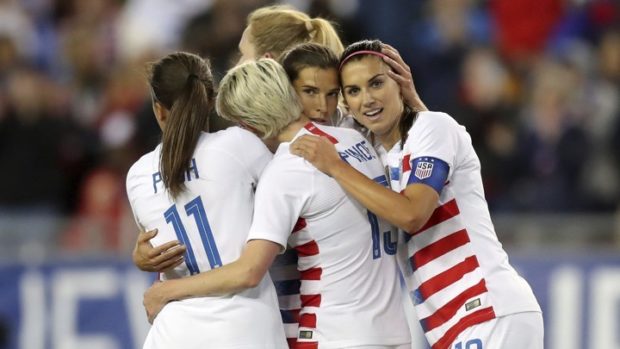#Equal Play #Equal Pay: US Women Soccer Team sues to end pay bias

In this Tuesday, March 5, 2019, file photo, United States’ Tobin Heath, second from right, is congratulated on her goal by Mallory Pugh (11), Megan Rapinoe and Alex Morgan (13) during the first half of a SheBelieves Cup soccer match against Brazil in Tampa, Fla. The U.S. women’s national soccer team’s discrimination lawsuit against the U.S. Soccer Federation highlights the struggle for female athletes globally to achieve fair compensation for their efforts, even if that doesn’t mean identical paychecks to their male counterparts. AP PHOTO
The US Women Soccer Team (“Women’s Team”) has won a record three World Cup championships, four Olympic gold medals, and many other international competitions. It is the three-time winner of the U.S. Olympic Committee’s Team of the Year Award and has been Sports Illustrated’sAthlete of the Year. It is currently ranked number one in the world, a position it has held ten out of the last eleven years. It is the defending champion in the World Cup that will be held in France this summer.
In contrast, the US Men Soccer Team (“Men’s Team”) has never won a World Cup or an Olympic gold medal. In the 2018 World Cup event, they were eliminated early and did not even qualify to the knockout stage.
However, the United States Soccer Federation, Inc. (“Federation”) the common employer of both the Women’s Team and Men’s Team, has consistently paid the women athletes substantially less than their male counterparts. For example, a comparison of the Women’s Team and Men’s Team pay shows that if each team played 20 friendlies in a year and each team won all twenty friendlies, female players would earn a maximumof $99,000 or $4,950 per game, while their counterpart male players would earn an averageof $263,320 or $13,166 per game. Thus a female player would earn only 38% of the compensation of her counterpart male player. A female player being asked to try out for the World Cup team is paid $15,000 while a similar male player would earn $55,000.
Players are paid a bonus for each advance to the World Cup. In 2014, the men advanced several rounds but were ultimately eliminated. However, they still earned a performance bonus totaling $5,375,000. When the women’s turn came in 2015, they won the Word Cup and were paid only $1,725,000. The women were paid nearly four times less than the men while performing better.
The Women’s Team has asked the Federation on several occasions to be paid equal to the male players. The Federation has rejected these requests, citing that “market realities” prevented this. It claims that the female players do not generate as much money as the males due to fewer viewership. However, the women claim they have earned more profit, won more games, earned more championships, and/or garnered higher television audiences.
For example, during the 2015 World Cup title game, the women garnered approximately 23 million viewers, making it the most watched soccer game in American TV history – male or female. In fact, for the years 2015-2016, due mainly to the success of the female players, the Federation earned a $17.7 million profit.
Having had enough of the inequality, and two months away from having to defend its title in France for World Cup 2019, the women players are suing its employer, the Federation, for equal pay.
The federal Equal Pay Act prohibits employers from discriminating against its employees on the basis of sex by paying lesser wages to employees of the opposite sex for “equal work.” These include jobs, the performance of which requires equal skill, effort, and responsibility, and which are performed under similar working conditions. The exceptions are made based on (i) a seniority system; (ii) a merit system; (iii) a system which measures earnings by quantity or quality of production; or (iv) a differential based on any other factor other than sex. The women also claim that the Federation’s discriminatory conduct on the basis of gender violated the Civil Rights Act of 1964.
(California’s Fair Pay Act, in contrast, prohibits employers from paying employees less than those of the opposite sex for “substantially similar work,” even if their titles are different or they work at different sites. This means the lower paid employee does not have to prove that the higher paid employee of the opposite sex has exactly the same job as she (or he) does.)
The women claim that the Federation has no legitimate, non-discriminatory reason for the gross disparity in pay. Nor can the pay difference be explained away by any bona fide seniority, merit or incentive system or any other factor other than sex. The case is currently pending in federal court in Los Angeles, and will likely be one of the more important cases to watch regarding the equal pay law.
The Law Offices of C. Joe Sayas, Jr. welcomes inquiries about this topic. All inquiries are confidential and at no-cost. You can contact the office at (818) 291-0088 or visit www.joesayaslaw.comor our Facebook page Joe Sayas Law. [C. Joe Sayas, Jr., Esq. is an experienced trial attorney who has successfully recovered wages and other monetary damages for thousands of employees and consumers. He was named Top Labor & Employment Attorney in California by the Daily Journal, consistently selected as Super Lawyer by the Los Angeles Magazine, is the recipient of PABA’s Community Champion Award, and is aPresidential Awardee for Outstanding FilipinoOverseas in 2018.]

